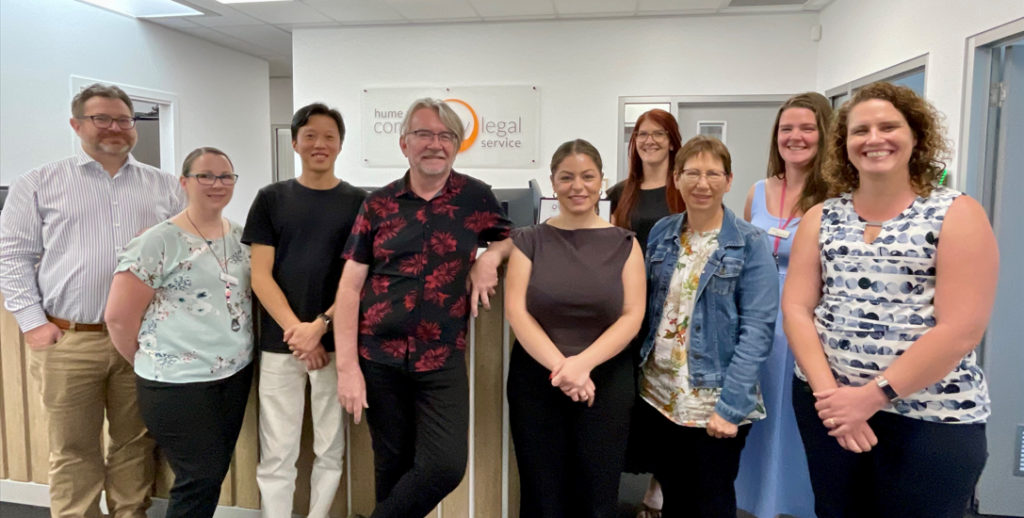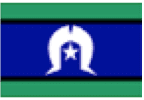
Caption: SSRV staff Mark Morand and Aylin Yigit with staff from Hume Riverina Community Legal Service.
As a specialist community legal centre with a state-wide remit, part of SSRV’s role is to provide Community Legal Education (CLE) and professional development on social security legal issues to the public, lawyers, financial counsellors and other community professionals, including in collaboration with Victoria’s network of around 50 Community Legal Centres.
At SSRV we know that people living in disaster-affected areas of Victoria are experiencing social security legal issues caused or exacerbated by bushfires, floods, storms and the pandemic.
In the context of the increasing frequency and severity of climate-related disasters in Victoria, over the past few months, SSRV staff have visited three community legal centres in disaster-affected regional areas, to provide CLE/professional development that included a focus on disaster-related social security legal issues.
In February, SSRV community lawyers, Liz Divers and Aylin Yigit, travelled to Morwell to meet with and provide training to lawyers, financial counsellors and other professionals from the Gippsland Community Legal Service. Areas of Gippsland have been affected by both bushfires and floods over the past several years.
In March, Aylin and project worker Mark Morand travelled to Mildura to meet with and provide professional development to workers from the Mallee Family Care. In recent years Mildura has been impacted by flooding, including riverine flooding from the Murray River. Before delivering their presentation, they had the opportunity to be driven to sites where the river had breached its banks, which improved their understanding of the devastation that occurred.
Also in March, Mark and Aylin travelled to Wodonga to meet with and provide professional development to workers from the Hume Riverina Community Legal Service. From Wodonga, they travelled to Corryong and to Mount Beauty where there was the opportunity to provide CLE directly to the public. This area of Victoria has also been affected by both bushfires and floods in recent years – in fact, our previous planned visit to Wodonga was prevented by the devastating floods of October 2022.
The wonderful collaboration between SSRV and community legal centres is crucial to our ability to deliver support to communities impacted by disasters.
What we wanted workers to know
- SSRV receives project funding that supports it to prioritise providing legal assistance services to people living in disaster-affected areas who are experiencing social security/Centrelink problems.
- Both our legal needs analysis and our case work provide us with a deep understanding of the relationship between disasters and subsequent social security issues.
- The types of social security problems that may arise when people are affected by disasters, from things as simple as a change in living arrangements after a home is damaged or destroyed by disaster to more complex matters.
- Relevant legislation and initial legal advice and assistance that could be provided.
- The SSRV Worker Help Line is a great resource for workers who are assisting their client with a social security legal issue, including when disaster has struck
What we wanted the public to know
- Their disaster-preparedness kit should include copies of identification documents, for Centrelink and other purposes
- It’s very important to update Centrelink if your home is affected by disaster – leaving your principal home, changes to your living arrangements and childcare arrangements, changes to your ability to meet mutual obligations can all impact your social security entitlements. Centrelink debts can be incurred if Centrelink is not updated about your circumstances.
- SSRV provides legal information, advice and assistance to people affected by disasters, including about appeal rights and processes
During our recent regional visits, SSRV workers also shared information about the recommendations for law reform that we have made directly to government that would make social security law and administration more attuned to the circumstances of disaster-affected people.
Our trauma informed approach
When raising the topic of disasters and social security in the course of our presentations, we were mindful that our audiences had potentially been directly impacted by disasters – which turned out to be the case. In discussing this important topic, we found that people were understanding of our broad finding – that social security law intersects poorly with the real-life consequences of disasters on people’s lives – and happy to hear that we have been able to raise this issue directly with senior departmental officers and relevant ministers in advocating for change.
During these visits, questions asked by lawyers and other community professionals centred on clarifying more complex aspects of the law, such as the treatment of debts, and the medical eligibility requirements for the Disability Support Pension.
The public, on the other hand, were more interested in asking about fundamental elements of eligibility for payments such as the Age Pension, and the complexities around Centrelink’s assets and income tests.
The trips to regional Victoria were very worthwhile for everyone involved and we received very positive feedback about the value of the visits.
While we were there…
In Mildura we also took the opportunity to conduct a group interview with seven workers to support a research project by Economic Justice Australia (EJA) studying the barriers to social security experienced by women in regional, rural and remote areas. We gathered a large amount of information which we provided to EJA for their research. For us, of particular interest were the challenges faced by women experiencing family violence in relatively in small communities where a lack of anonymity, among other things, adds an extra dimension of difficulty to their experiences. We look forward to reading the results of the research project.
Main image: SSRV staff Mark Morand and Aylin Yigit with Allie Collyer from Mallee Family Care Community Legal Centre.




